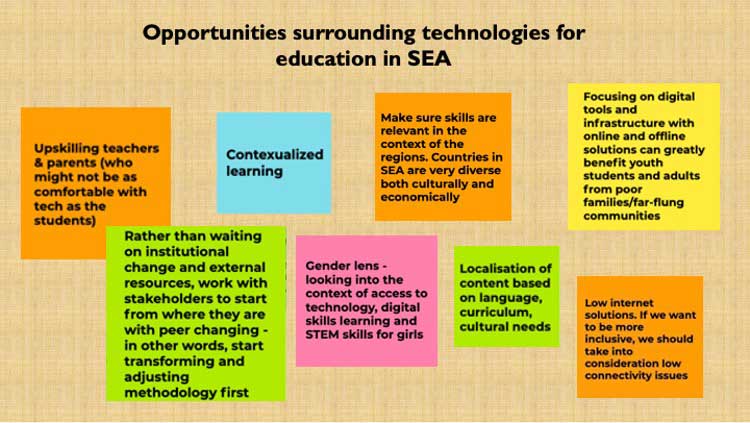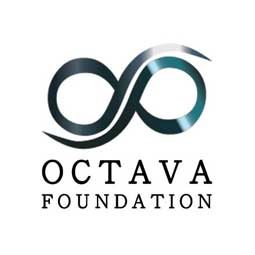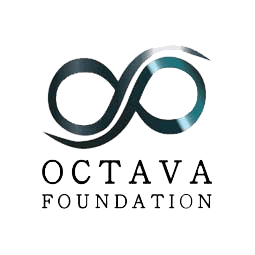Realizing Education Technologies’ Potential in Enabling Quality Education for All in Southeast Asia
14 July 2021 5-minute read

Excerpts from the Jamboard notes contributed by workshop participants
2021 June, Octava Foundation held a virtual Challenge Design Workshop curated by MIT Solve. The workshop was intended to help inform the design of the upcoming Octava Social Innovation Challenge, which aims to support innovative solutions that harness technology to achieve equitable quality education in select Southeast Asian countries: Malaysia, Indonesia, the Philippines, Thailand, and Vietnam.
Over 50 participants, including leaders of education INGOs, EdTech innovators, educators, social entrepreneurs, capacity builders, and more, examined pivotal topics surrounding EdTech in Southeast Asia. The participants engaged in deliberation surrounding the role diverse EdTech solutions could play in solving complex education challenges such as enabling foundational literacy & numeracy, teacher quality, content & curriculum, etc. The group further highlighted key opportunities in furthering EdTech in the region and laid out the critical factors necessary for EdTech solutions to achieve true impact and realize the promise of quality education for all.
Participants presented diverse perspectives and offered Octava Foundation and MIT Solve new insights into the programmatic and systemic challenges faced by EdTech startups and leaders from education INGOs from the region. These would help shape the Octava Social Innovation Challenge, that aims to support similar organizations through capital and capacity resources.
In summary, the following key opportunities and ideas were surfaced through the robust discussions:
1. Use of learning technologies should enhance the quality of learning in the existing system instead of replacing it or competing with it
- While the pandemic has highlighted the disparities in terms of accessibility, it has also brought to the fore the gaps in ensuring children are learning as intended. To address this, solvers could innovate to make learning material interactive and engaging (e.g., comics, games) in order to promote joy in learning.
- Solutions can leverage technologies that could adapt and personalize learning for each student and offer students ownership over their own learning.
- Socio-emotional learning is critical. There is an increasing need to factor in the emotional and mental wellbeing of students, as well as support development of transferable skills like communication, collaboration, and self-agency.
2. Learners and their needs are diverse; solutions will need to be contextualized and accessible to all
- While the EdTech sector has been steadily growing across the 5 Southeast Asian countries, many proposed innovations are only targeting middle to higher income customers. Innovation using lower-tech represents an opportunity to reach students at scale and at the middle and bottom of the income pyramid.
- Although some solutions have had successful implementation in specific geographies, not all of these solutions can be readily adopted and replicated. Countries and provinces within the Southeast Asian countries have infrastructural gaps. Further investment in digital inclusion needs to be achieved to realize the full potential of education technologies.
3. It would be essential to engage multiple stakeholders and strengthen their capacity
- Parents could play a more active role in their child’s education, especially when learning goes remote. This would mean enabling parents with strategies and digital literacy in order to assist their children in their learning.
- Teachers need to be provided with more regular support and training to ensure that they are equipped with the knowledge and skills necessary to deploy digital tools and content, and to harness blended learning efficiently for better outcomes for learners.
- There is a need for school leaders to recognize the structural and institutional needs of adopting EdTech solutions. Schools need to employ the necessary resources (e.g., electronic devices, stable internet connection) in order to harness and support new technology.
4. It is challenging and a non-linear process for innovators to translate their passion into scalable product
- EdTech innovators and startups in the region are facing obstacles such as a lack of access to risk capital and difficulties in attracting requisite talent and expertise. They also need greater measurement capacity to produce evidence and demonstrate the effectiveness of their solutions. The absence of the above makes it difficult for them to scale their product as they cannot prove their credibility to both policymakers and the private education providers to adopt their solutions.
- Start-ups are trying to solve extremely complex and multifaceted problems of Quality Education. Different start-ups often target various facets of the same problem but are unaware of the attempts of other stakeholders, resulting in a missed opportunity for collaboration. Given that they share a common goal, like-minded innovators could collaborate more often to devise solutions that achieve their intended impact.
- Access to learners at scale is limited. Children at the “bottom-of-the-pyramid” in Southeast Asia are often served through the public schools, making it challenging for EdTech solutions to produce any substantial impact without the support of local and national governmental education bodies. Lack of digital literacy, exposure to opportunities, and bureaucracy could be possible reasons for the sluggish procurement by the government. Advocacy and efforts to bring EdTech solutions, educators, and education policymakers closer could be extremely valuable in creating a more vibrant EdTech ecosystem.
The workshop participants shone light on the issues at hand through their unique perspectives and firsthand experiences. While the participating organizations might be grappling with differing challenges and may have achieved different degrees of success in their pursuit, they were all in unison over the potential of EdTech in the region and the efficacy and efficiencies learning technologies could bring to the existing education systems.
Octava Foundation is partnering with MIT Solve to launch our Social Innovation Challenge. If your organization has an existing education solution that is harnessing technology or has an EdTech solution that can be scaled, we welcome you to submit your solution. Each winning solution would receive a minimum of $50,000 in grant funding and access to a tailored support program run by MIT Solve, Octava Foundation, and its partners. You can access the application here.


